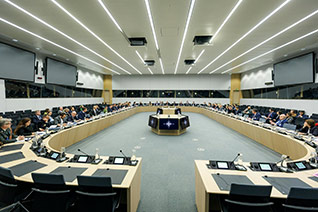Contact Point Embassies in partner countries
Since the early 1990s, NATO has developed a network of Contact Point Embassies (CPEs) to support relations with its partners world-wide through public diplomacy activities in NATO’s partner countries.
Role and assignment of CPEs
CPEs are a valuable tool that contributes to NATO’s communication and outreach efforts to local audiences. In every partner country, an embassy of one or more NATO member states serves as a contact point for disseminating information about the role and policies of the Alliance. In addition to this public diplomacy role, the CPEs’ mandate also includes support – as required – for the implementation of other agreed activities with partners.
A CPE is not NATO’s diplomatic mission in the host country. It does, however, play a useful role as liaison between NATO and the host country, helping to identify civil society actors, journalists and community leaders, and spot communication opportunities within the country. A CPE organises or co-organises public diplomacy events to promote NATO’s policies and to highlight NATO’s cooperation with a partner. It also provides first-hand political reporting, media monitoring and other relevant information, for example opinion polls, to NATO officials. The CPE can assist NATO in identifying, tracking and reporting on key narratives aimed at undermining NATO and NATO’s partnership with the host country and thus contributes to NATO’s efforts in countering information threats.
In addition, a CPE can also assist, as appropriate, with logistical support, political advice and briefings on relevant developments in the host country in preparation for visits to the country by the Secretary General, NATO International Staff and NATO forces. It also regularly liaises with other NATO member country embassies in the host country about NATO’s agenda and involves them in NATO-related activities or events.
NATO member countries volunteer the services of their embassies in partner countries to assume the duties of Contact Point Embassy for a period of two years, renewable up to four years. The final decision on the assignment of CPEs is taken by consensus in the North Atlantic Council – the principal political decision-making body within NATO. The Public Diplomacy Division at NATO Headquarters in Brussels, Belgium coordinates the CPE network and stays in close contact with CPEs.

Every two years at the beginning of a new CPE cycle, the NATO Public Diplomacy Division invites representatives from all its CPEs to NATO Headquarters for an orientation conference. The last conference took place on 20-21 January 2025.
2025-2026 cycle of CPEs
| Partner | NATO member country assigned as CPE |
| African Union | Canada |
| Algeria | Netherlands |
| Armenia | Greece |
| Australia | Latvia Spain |
| Austria | Bulgaria Croatia |
| Azerbaijan | Slovakia Sweden |
| Bahrain | United Kingdom |
| Bosnia and Herzegovina | Norway |
| Colombia | Germany |
| Egypt | Italy Türkiye |
| Georgia | Romania United Kingdom |
| Iraq | Italy |
| Ireland | Luxembourg Slovenia |
| Israel | Czechia |
| Japan | Norway Romania |
| Jordan | Romania |
| Kazakhstan | Germany Netherlands |
| Republic of Korea | France |
| Kyrgyzstan | Türkiye |
| Kuwait | Canada |
| Malta | Italy |
| Mauritania | France |
| Republic of Moldova | Poland |
| Mongolia | France |
| Morocco | Hungary Spain |
| New Zealand | United States |
| Pakistan | Türkiye |
| Qatar | United States |
| Serbia | Finland Germany |
| Switzerland | Belgium |
| Tajikistan | Türkiye |
| Tunisia | Finland Portugal |
| Turkmenistan | Türkiye |
| Ukraine | Lithuania |
| Uzbekistan | Hungary |
| United Arab Emirates | Denmark Estonia |
